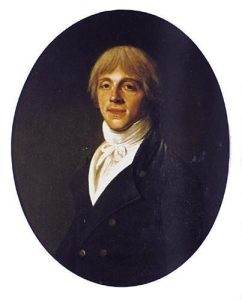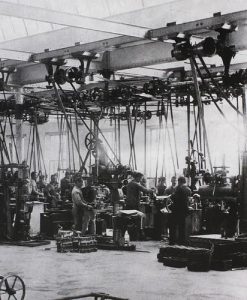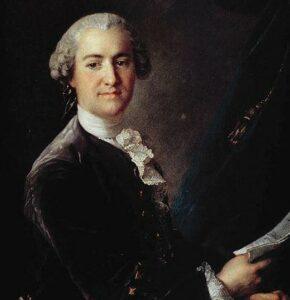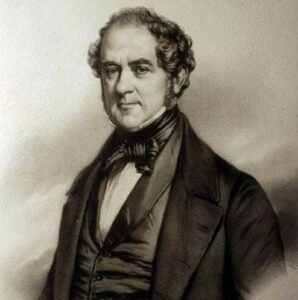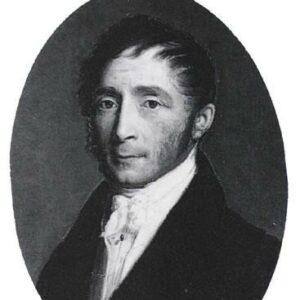Jean-Jacques was the patriarch of the family
The first protestant members of the Delessert family immigrated to Switzerland from France after the Revocation of the Edict of Nantes in 1685. Jean-Jacques was born in Cossonay in the Vaud canton, Switzerland in 1690, but he returned to Lyons in France in 1721, where he founded a firm dealing in the silk trade.
His son Etienne (1735-1816) settled in Paris, where he became a banker and founded one of the first insurance companies in France. He was a philanthropist who cared about the common good of the people and just before the beginning of the Revolution he founded two non fee-paying schools for protestant children. He was arrested in 1792 and it was only because Robespierre died in 1794 that he was able to survive the Revolution.
At the time of the Directoire he took up his former professional activities once more and also became interested in agronomy and agriculture. Together with other financiers he founded the Banque de France in 1800. At his death in 1816, he was buried in the family graveyard in Rue Lekain, a small road in the commune of Passy, where his family had just bought a considerable amount of land.
Benjamin Delessert founded several firms
Jules Paul Benjamin 1773-1847), one of Etienne’s sons, started working for his father’s bank in 1796 and in 1802 became Regent of the Banque de France. He bought property situated between the Rue Raynouard as we know it today and the quai de Passy ; this is where, in the XVIIIth century, the well-known spa of Passy could be found.
On this plot of land he founded the first sugar beet refinery in 1801 and started up a cotton mill again which had been formerly owned by a Flemish businessman between 1794 and 1800.
He went on to buy other plots of land in the vicinity and finally had a large mansion built in the neo-classical style with a footbridge 52 metres long leading from his house to his office. Later, in 1824, he added on a Swiss chalet with cows grazing in front of it. This brought to mind his Swiss origins and was also very much in fashion at the time, because the Romantics were fond of building “fabriques” ; these were ornate classical temples, ruins or pastoral dwellings with which they decorated their parks.
Benjamin Delessert was also a botanist of great repute : he had an outstanding collection of pressed flowers and corresponded with the most eminent naturalists of his time ; he was even elected an honorary member of the Académie des Sciences.
In 1815, he took up a political career ; he was a deputy for Paris and then later for Saumur from 1817 to 1842. His political affiliation was left of centre and one of his main aims was to improve the lot of hospital patients and bring an end to capital punishment.
In 1818, he was one of the founder members of the Caisse d’Epargne and remained its director until the end of his life.
He, too, was buried in the family churchyard in Rue Lekain.
The last members of the Delessert family
Benjamin’s two brothers François (1780-1868) and Gabriel (1786-1858) also had mansions built, close to his own. In fact, the houses numbered 19 to 27 in the rue Raynouard as we know it today all belonged to the Delessert family and the first protestant service in Passy in 1856 was held in an old greenhouse situated in the family park.
Gabriel was the mayor of Paris between 1836 and 1848, when he was made a peer.
François was a banker like his father and was president of the Chambre de Commerce de Paris and also of the Caisse d’Epargne.
His son, Benjamin, (1817-1868), together with his father, set up and financed a civil building society in 1868 which was used to acquire a plot of land in Rue Cortambert. This was rented and later a “portable temporary building”(the former chapel from the Avenue Rapp) was erected on it and used by the protestant community of Passy, who were attached to the reformed parish of the Batignolles at the time.
The land was officially bought in January 1881, when the parish of Passy was founded, with an independent parish council active from 1882 onwards. The present temple was only built in 1888
The last representatives of the Delessert family after Benjamin were his sisters : Madeleine married baron Frédéric Bartholdi, the sculptor’s brother and Caroline married baron Rodolphe Hottinguer. They presided at the setting up of the Delessert-Bartholdi foundation, situated at numbers 3 and 5 Rue Lakain, where a small chapel was built and a public dispensary run by deaconesses from the parish. .
At a later date, these buildings were used by the scouts of the parish of Passy-Annonciation.
The family churchyard nearby, where nearly all the members of the Delessert family had been buried, still remained intact.
In 1961, the remains were taken to the main Passy churchyard in the Place du Trocadéro and flats were built on the site of the former churchyard ; two flats were set aside for the use of pastors, as well as others used for church meetings, with catering facilities for special Church occasions.
There is a boulevard in the XVIth arrondissement and also a small road in the Xth arrondissement which both bear the name Delessert.

